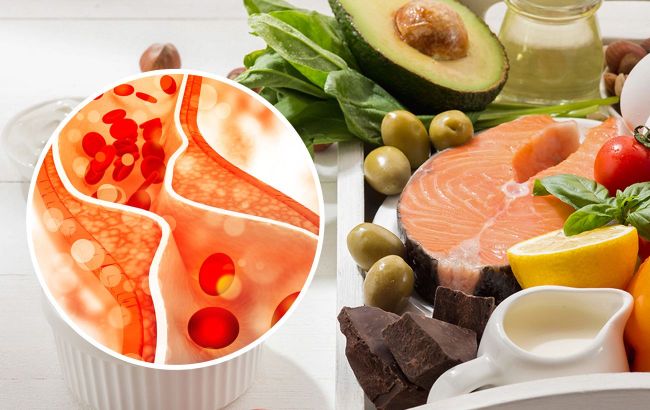These 10 foods best lower cholesterol levels
 Which foods help lower cholesterol (collage by RBC-Ukraine)
Which foods help lower cholesterol (collage by RBC-Ukraine)
The notorious cholesterol is an essential ingredient for the proper functioning of the entire body, especially the brain, endocrine, and digestive systems. However, excess LDL cholesterol is dangerous as it clogs veins and can lead to atherosclerosis, heart attack, or stroke.
Here are the 10 foods that most effectively lower bad cholesterol levels.
What is cholesterol and why should it be lowered
Cholesterol is essential for the normal functioning of the body. It is, among other things, a component of cell membranes, the myelin sheath of nerve cells, and a precursor to the synthesis of vitamin D3 and hormones. However, excess bad cholesterol, or LDL, can clog arteries and increase the risk of heart disease, as well as heart attacks and strokes.
Nutritionist Sunny Patel has named 10 foods that have a beneficial effect on heart health, blood vessels, and the circulatory system.
Foods that lower levels of bad cholesterol
Whole grains contain soluble fiber, which helps lower bad LDL cholesterol. Whole grains such as barley, quinoa, brown rice, and whole wheat bread also provide fiber and nutrients that support heart health.
Fatty fish - not all fats are harmful. Omega-3 fatty acids found in fatty marine fish have a positive impact on brain and heart function, and should not be avoided.
These fatty acids have been proven to lower blood triglyceride levels and reduce the risk of heart disease. Cold-water fish such as salmon, mackerel, sardines, and trout are excellent sources of omega-3 fatty acids.
Nuts, like fish, contain healthy fats that are beneficial for heart and blood vessel health. However, they should be consumed in moderation. A 2020 study showed that eating just a handful of almonds daily helps lower blood pressure. Another study published in Hypertension found that regular consumption of walnuts by people over 60 with mild hypertension can also reduce blood pressure.
Avocados are fruits packed with healthy monounsaturated fats. These fats help increase good HDL cholesterol while lowering bad LDL cholesterol. Additionally, avocados are rich in potassium, even more than bananas. Potassium supports the function of the nervous and muscular systems, including the heart, and helps control blood pressure.
Legumes, such as beans and lentils, are considered plant-based meat substitutes, rich in protein, fiber, and other essential nutrients. Unlike meat, which is high in unhealthy saturated fats that can lead to a sharp increase in bad cholesterol levels, legumes are a healthier choice. It is recommended to eat legumes 2-3 times a week.
Fruits, especially berries like blueberries, blackberries, strawberries, and raspberries, as well as apples, grapes, and oranges, are rich in flavonoids. These compounds have antioxidant and anti-inflammatory properties, which help reduce oxidative stress and regulate blood glucose and insulin levels.
Thus, they support heart health and, thanks to their fiber content, aid digestion while helping you feel full for longer. Eating them as snacks between meals can assist in weight loss, which positively impacts heart function and cholesterol levels.
Vegetables are rich in fiber and essential nutrients necessary for the proper functioning of the body. They are a key component of diets aimed at lowering cholesterol levels. Especially recommended are broccoli, carrots, spinach, leafy greens, and Brussels sprouts.
Olive oil, particularly extra virgin, contains monounsaturated fats and antioxidants. This helps support heart health, reduces inflammation, and has anti-aging properties by neutralizing free radicals, which are responsible for cell damage and, thus, the aging process.
Research shows that daily consumption of olive oil is associated with a reduced risk of cardiovascular diseases, type 2 diabetes, and certain types of cancer.
Soy products, such as tofu, soy milk, and miso paste, contain plant compounds called isoflavones. These phytoestrogens help lower bad cholesterol levels. They also possess antioxidant and anti-cancer properties.
Dark chocolate
Many people will be pleased to know that dark chocolate can also help lower bad cholesterol levels. However, it should contain at least 70% cocoa. This type of chocolate is rich in valuable flavonoids and other antioxidants that can positively affect heart and circulatory health. So, reach for dark chocolate instead of cookies or candy bars.
The article uses sources from the Instagram account of dietitians Sunny Patel and Strona Zdrowia.
This material is for informational purposes only and should not be used for medical diagnosis or self-treatment. Our goal is to provide readers with accurate information about symptoms, causes, and methods of detecting diseases. RBС-Ukraine is not responsible for any diagnoses that readers may make based on materials from the resource. We do not recommend self-treatment and advise consulting a doctor in case of any health concerns.

